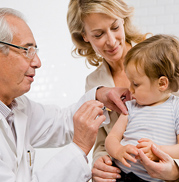 While most people in Europe follow expert advice on immunisation, vaccine uptake rates are still too low, as recent measles outbreaks have illustrated.
While most people in Europe follow expert advice on immunisation, vaccine uptake rates are still too low, as recent measles outbreaks have illustrated.
Let’s Talk About Protection, published by the European Centre for Disease Prevention & Control (ECDC), is a sophisticated handbook to help health professionals communicate with patients who have questions about immunisation.
We’ve come long way from the traditional tactic of firing facts at the public and expecting the message to stick.
(Flu vaccine advertising: does it work?)
For a start, the guide advises doctors and other health professionals that listening is the first step in effective communication. It also splits the ‘public’ into a several sub-audiences with varying degrees of hesitancy, each of which requires a different approach.
In line with WHO Europe’s recently-published Guide to Tailoring Immunization Programmes, the ECDC document notes that unique messages – and messengers – are essential to improving vaccine uptake in hard-to-reach or under-served populations such as the Roma communities.
Immunisation managers and health professionals should draw on social marketing techniques when designing communication campaigns, using a range of channels – from phone and text messages, to social media and working with traditional broadcast and print outlets.
The content of messages should, it says, emphasise that opting out of vaccinating is socially unacceptable while giving more visibility to those who have been vaccinated. However, the authors also call for more focus on the factors influencing behaviour – such as access to immunisation services – rather than concentrating on the message.
Tools for doctors
The role of health professionals in immunisation remains highly valued – including by doctors themselves. But there have been questions in the past about whether doctors are equipped to address patient questions.
Your Child & Immunisation: Q&A
The ECDC’s new paper seeks to address this by including communication tips for doctors and answers to frequently-asked questions. Doctors are advised to tell stories as well as sharing scientific facts when discussing vaccines, and to leave the door open even when patients (or the parents of young patients) decide not to take their advice.
In addition, there is a dose of devastatingly straightforward advice for health professionals: like ‘lead by example’ by making sure your own vaccinations are up to date and in line with official recommendations.
After all, who would listen to a doctor that refuses to take their own advice?
What is social marketing?
Social marketing is the systematic application of marketing, along with other concepts and techniques, to achieve specific behavioural goals for a social good.
It harnesses marketing methods which have proven successful in the commercial sector and uses them to further public health goals.
Work in this area is based on research on behavioural change and behavioural economics. It centres on understanding the behaviour of your target audience and the unique barriers to behavioural change.
Successful social marketing can involve communicating tailored messages to individuals or removing obstacles to healthy behaviour. For example, sending text message reminders can help tip some people into action. Equally, giving students a map to the on-campus health centre is an effective way to increase uptake of student health services.
Developments in this area could, according to some experts, ultimately lead to individualised communications on health issues, not unlike the methods used by online retailers and advertisers who match their advertisements to web users in an effort to lead them to make purchases.
The goal of social marketing could be to have a vaccine, take up exercise, quit smoking or walk to work.




